
Social media employee handbook: Balancing authenticity and professionalism
Table of contents
- Introduction
- The benefits of employees being active on social media
- Professional vs. personal social media behavior
- Preparing to be socially active: optimizing profiles and sharing content
- How to prepare for being socially active
- Platform-specific requirements for creating a strong professional profile:
- Optimization essentials
- General dos and don'ts for your social media employee handbook
- World politics and sensitive topics
- Name-dropping best practices
- Professional considerations
- Mindful tagging and mentions
- Content strategy
- Engagement strategy
- Content planning
- Take into consideration engagement and authenticity
- AI can help you write and summarize, but use it wisely
Introduction
Social media has become an integral part of corporate communication, with 98% of employees using it for personal use and 80% using it on the job. Having a social media employee handbook is an effective way of guiding employees to leverage social media effectively while maintaining professional standards. In 2023, approximately 73% of employees reported using social media during work hours for personal and professional purposes. This figure rose to 78% in 2024, indicating a growing integration of social media into daily work routines. Employees’ average time on social media during work hours increased from 1.7 hours per day in 2023 to 1.9 hours per day in 2024. Notably, 55% of employees self-reported spending 1 to 2 hours daily on these platforms in 2024.
When employees actively share content on social media, it reaches 561% further than official company channels. It receives 800% more engagement. This handbook will guide you in leveraging social media effectively while maintaining professional standards.
Using social, employees have become influential ambassadors for their company. Employee participation on social media can amplify the company’s reach, enhance personal branding, and build authentic connections with audiences. However, balancing authenticity and professionalism is critical to ensure both employees and the company benefit from this activity.
The following information will help you navigate the intersection of professional and personal social media use, optimize your presence on platforms, create valuable content, and engage meaningfully while upholding professionalism.
The benefits of employees being active on social media
For your company:
- Boosted visibility and trust: Employees amplify the company’s message and make it more relatable to their network of connections.
- Humanized brand image: Audiences are likelier to connect with employees than a corporate logo, making your brand approachable and authentic.
- Improved talent acquisition: Employees’ authentic advocacy can attract top talent by showcasing the company’s culture.
- Enhanced thought leadership: When employees share insights, the company is positioned as a brand that hires professionals and is knowledgeable in their industry.
For you (the employee):
- Personal branding: Building your professional online presence can open doors to future career opportunities, partnerships, and connections.
- Skill development: Regular social media activity improves communication, networking, and personal marketing skills.
- Credibility and influence: You can position yourself as knowledgeable about your field by sharing valuable content.
- Stronger professional networks: Active participation can foster meaningful relationships with industry peers and colleagues.
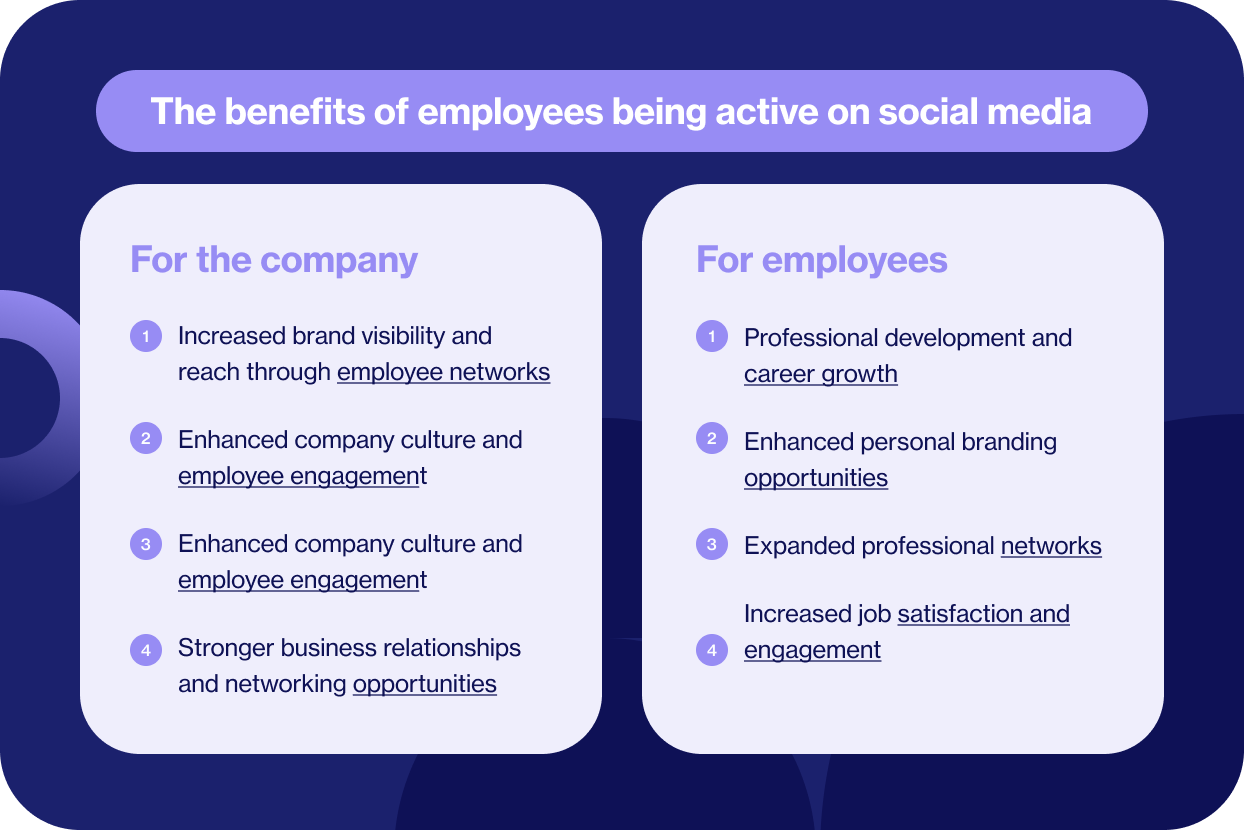
Further reading
Benefits for the company
- Increased brand visibility and reach through employee networks
- Enhanced company culture and employee engagement
- Stronger business relationships and networking opportunities
Benefits for employees
- Professional development and career growth
- Enhanced personal branding opportunities
- Expanded professional networks
- Increased job satisfaction and engagement
Professional vs. personal social media behavior
Distinguish between personal and professional conduct on social media.
This table provides a guide for navigating both:
|
Aspect |
Professional behavior |
Personal behavior |
| Tone | Polished, respectful, and aligned with company values | Casual, authentic, and reflective of personal identity |
| Content focus | Industry insights, company news, thought leadership, and value-driven discussions | Hobbies, personal interests, family updates, or lifestyle content |
| Tagging/Mentions | Mindful and strategic mentions of colleagues, clients, or partners | Friends and family tagging for personal interactions |
| Privacy considerations | Limited personal details and privacy settings adjusted for professional audiences | Share personal milestones but ensure appropriate privacy settings |
| Engagement | Engage thoughtfully in professional discussions; avoid heated or polarizing debates. | Open, relaxed engagement; maintain discretion in sensitive conversations |
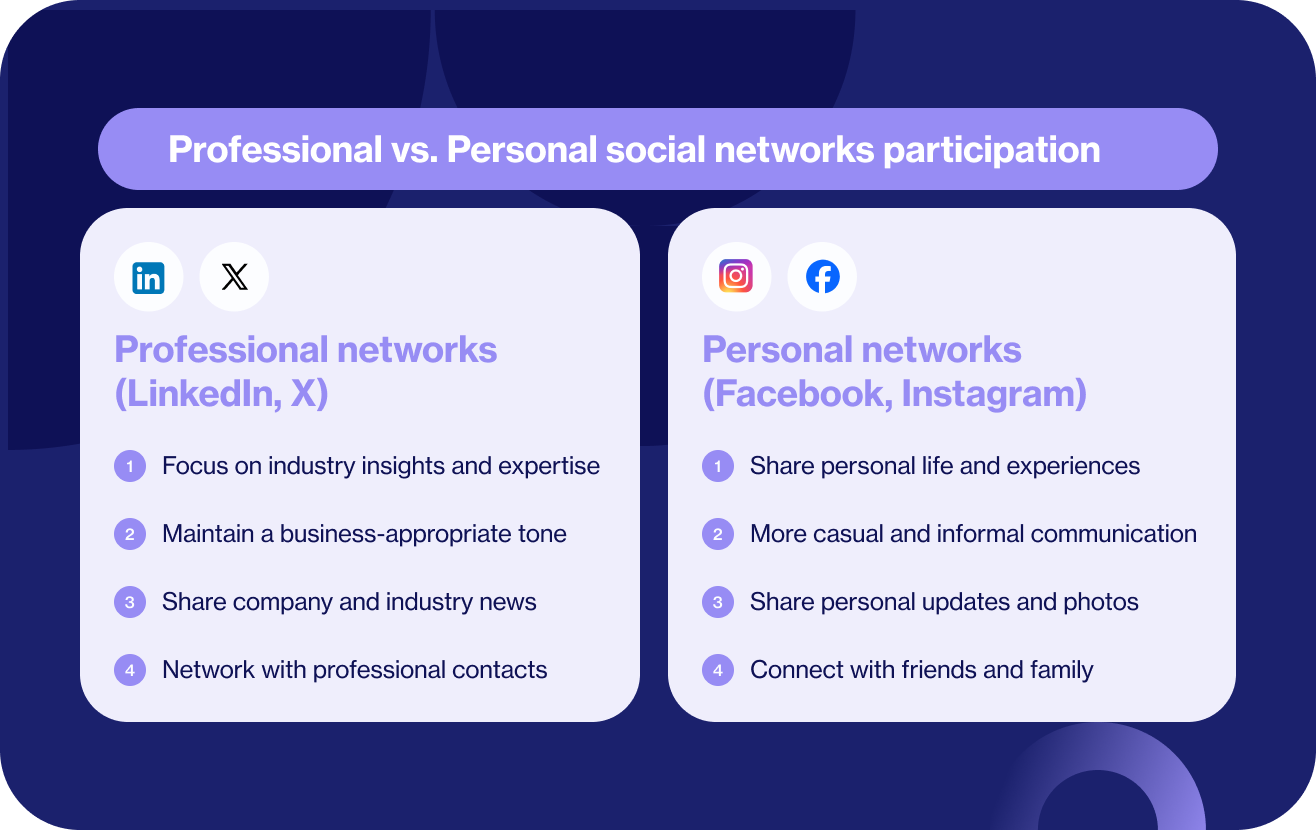
Preparing to be socially active: optimizing profiles and sharing content
Your online presence begins with an optimized profile. Equally important is how you engage with content; when you prepare to be socially and professionally active, you must prepare.
Profile optimization essentials
|
Aspect |
Optimizing Profiles |
Sharing Content and Engaging |
| Focus | Presenting a professional, complete, and polished digital identity | Providing value through meaningful posts, shares, comments, and engagement |
| Key Elements | Profile picture, bio, headline, experience, and skills | Thoughtful captions, relevant hashtags, and authentic interactions |
| Frequency | Once during setup, with periodic updates | Regularly, with a consistent schedule to stay visible |
How to prepare for being socially active
Preparing your profile:
- Use a professional headshot and try to keep it current every couple of years
- Write a compelling headline and summary – use AI tools to help
- Showcase relevant skills and experiences – be real
- Regularly update achievements and credentials
Preparing content and preparing to be active:
- Read and research for industry insights
- Go into your feeds and read others’ posts
- Join groups and follow brands (even competitors)
- Build your network with professional social connections
Platform-specific requirements for creating a strong professional profile:
| Platform | Optimization Tips |
| Use a professional headshot, craft a clear and compelling headline, complete all profile sections, and include relevant keywords. | |
| X (formerly Twitter) | Use a concise bio with relevant hashtags and a professional banner image, and regularly engage to maintain visibility. |
| Opt for a clear bio, relevant profile links, and visuals that align with your professional and personal brand. | |
| Set privacy settings appropriately for personal/professional overlap and update “About” sections with professional details. |
Optimization essentials
LinkedIn Profile
- Use a professional headshot and eye-catching header image
- Craft a compelling headline beyond just your job title
- Write a detailed “About” section highlighting your expertise and story
- Add relevant media and links to showcase your work
- Update your experience section regularly
X (Twitter) Profile
- Choose a clear, memorable username
- Upload a high-quality profile picture and banner image
- Write a concise, keyword-rich bio (160 characters max)
- Include relevant links and location
- Pin important content to your profile
Instagram Profile
- Select a professional profile photo
- Create a clear, searchable username
- Write a compelling bio with relevant keywords
- Add appropriate links and contact information
- Organize highlights strategically
Facebook Profile
- Use your company logo or professional headshot
- Design an engaging cover photo
- Complete the “About” section thoroughly
- Add relevant business information
- Enable appropriate privacy settings
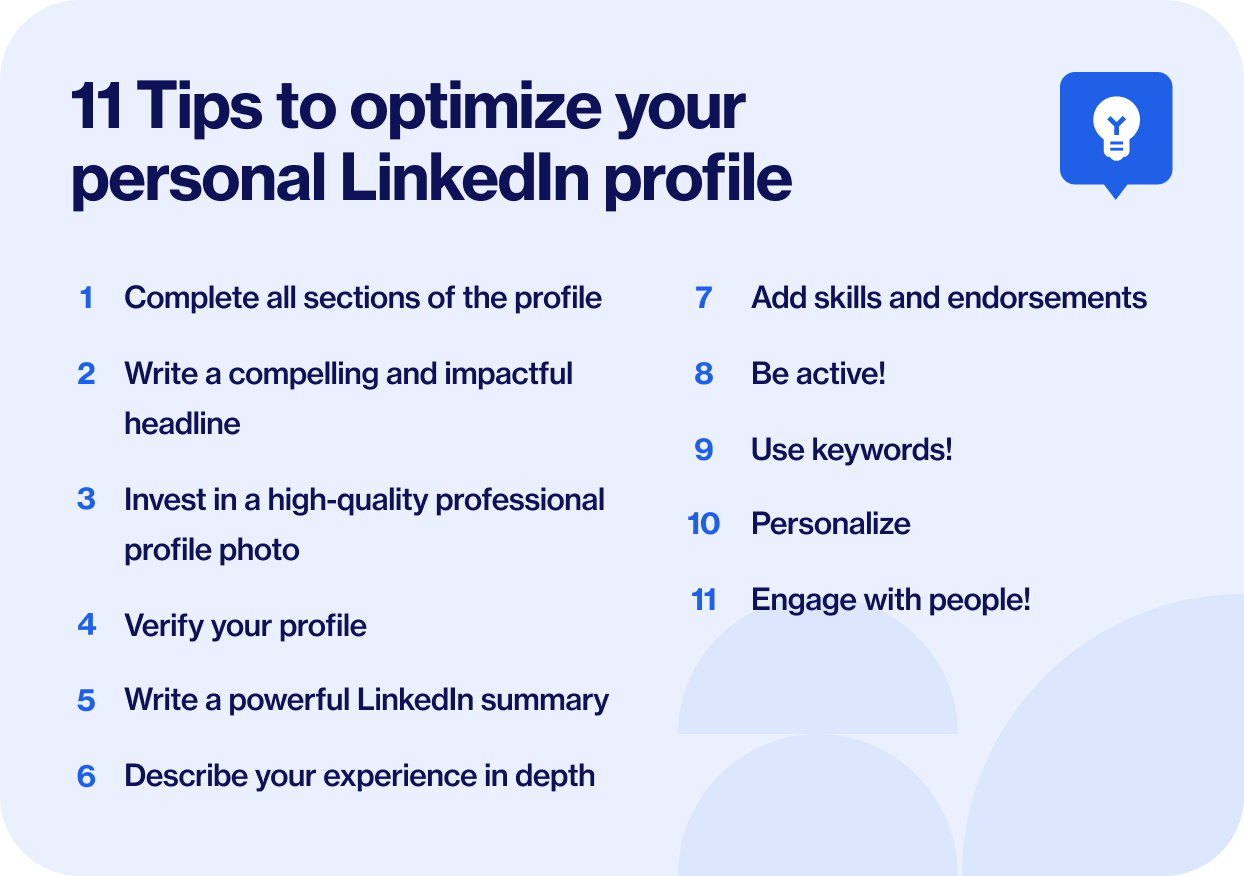
Being active and engaging on social media can significantly benefit the company and the employee. You need to maintain professionalism and foster authentic connections.
Remember: Your social media presence reflects both your personal brand and your company’s values. Use these platforms thoughtfully and strategically to build meaningful professional relationships while maintaining appropriate boundaries.
Professional social media presence requires careful attention to multiple aspects. Here’s a comprehensive guide to optimizing and maintaining your social media profiles effectively:
General dos and don’ts for your social media employee handbook
Professional Networks (LinkedIn)
| Dos | Don’ts |
| Share industry insights and company news | Post confidential information |
| Engage in industry discussions | Make controversial political statements |
| Maintain a professional profile | Share personal grievances |
| Network with industry peers | Spam connections with sales pitches |
Personal Networks (Facebook/Instagram)
| Dos | Don’ts |
| Use privacy settings | Share workplace conflicts |
| Keep work references general | Post during work hours |
| Be mindful of company association | Disclose sensitive information |
| Separate personal and professional content | Tag a company without approval |
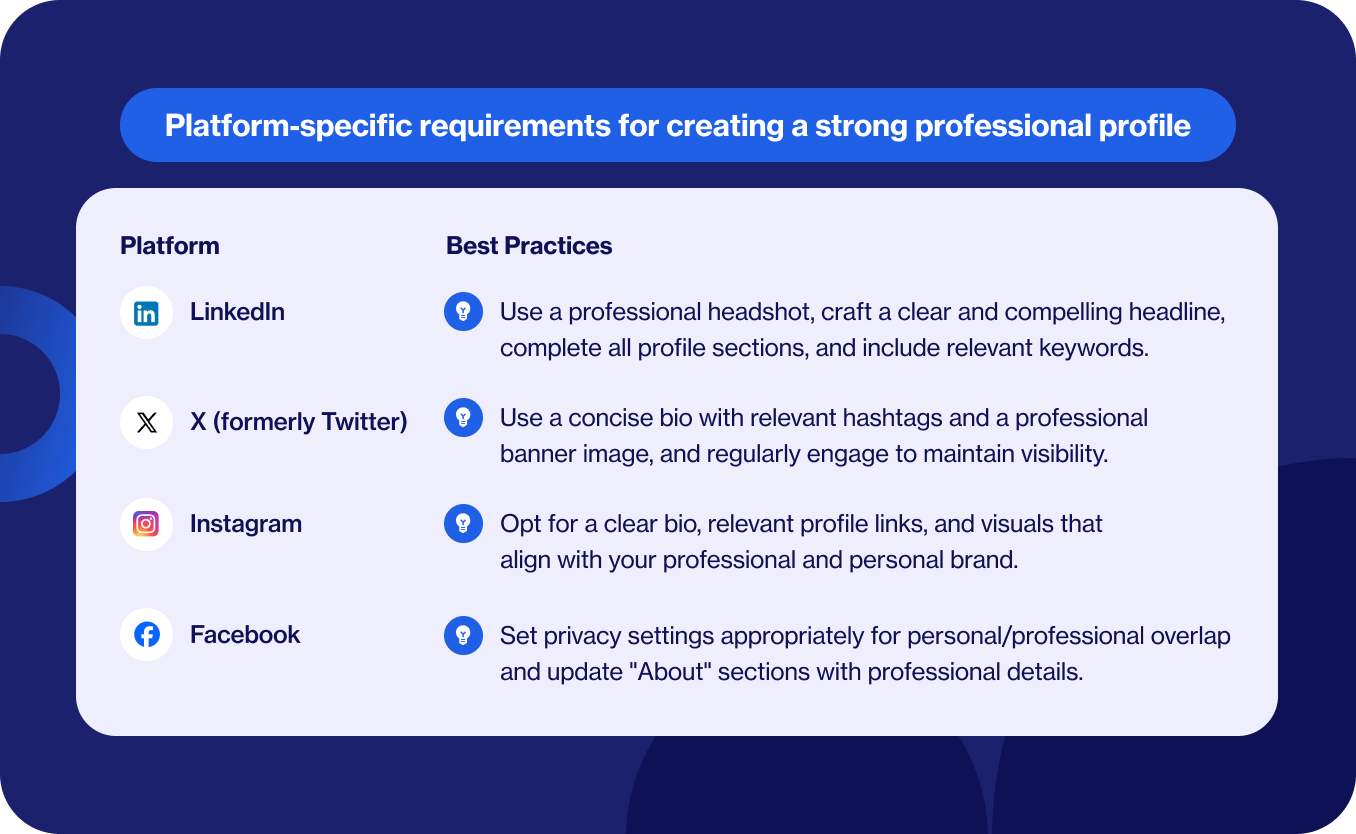
World politics and sensitive topics
Professional networks require extra caution regarding world politics, conflicts, and wars. Here’s why:
Sensitive topics
- Avoid commenting on ongoing international conflicts.
- Refrain from taking political stances on global issues
- Skip discussions about wars or military actions
- Be mindful that your audience may have personal connections to conflicts
Professional Impact
- Political posts can damage career opportunities
- Controversial statements may affect business relationships
- Employee opinions could impact the company’s reputation
- Colleagues and superiors can view your activity indefinitely
Name-dropping best practices
When to name-drop
- Only mention connections that are genuine and relevant to the conversation
- Use name-dropping to add value, not to artificially boost your status
- Ensure you have permission before implying endorsements or referrals
When to avoid it
- Never falsely claim relationships that don’t exist
- Don’t use social media connections as proof of genuine relationships
- Avoid mentioning people out of context just to appear important
Professional considerations
Workplace context
- Keep work-related grievances offline
- Don’t tag colleagues in controversial or sensitive discussions
- Maintain separate personal and professional social media presence
Mindful tagging and mentions
Best practices:
- Seek permission before tagging colleagues, clients, or partners.
- Ensure the content you tag others aligns with their professional image.
- Avoid over-tagging, as it can appear spammy or insincere.
Sharing others’ content
- Add context to your shares, explaining why the content is relevant or valuable, and add a comment about why you are sharing it.
- Avoid sharing content without first reviewing it.
Best tagging and “mention” practices by platform:
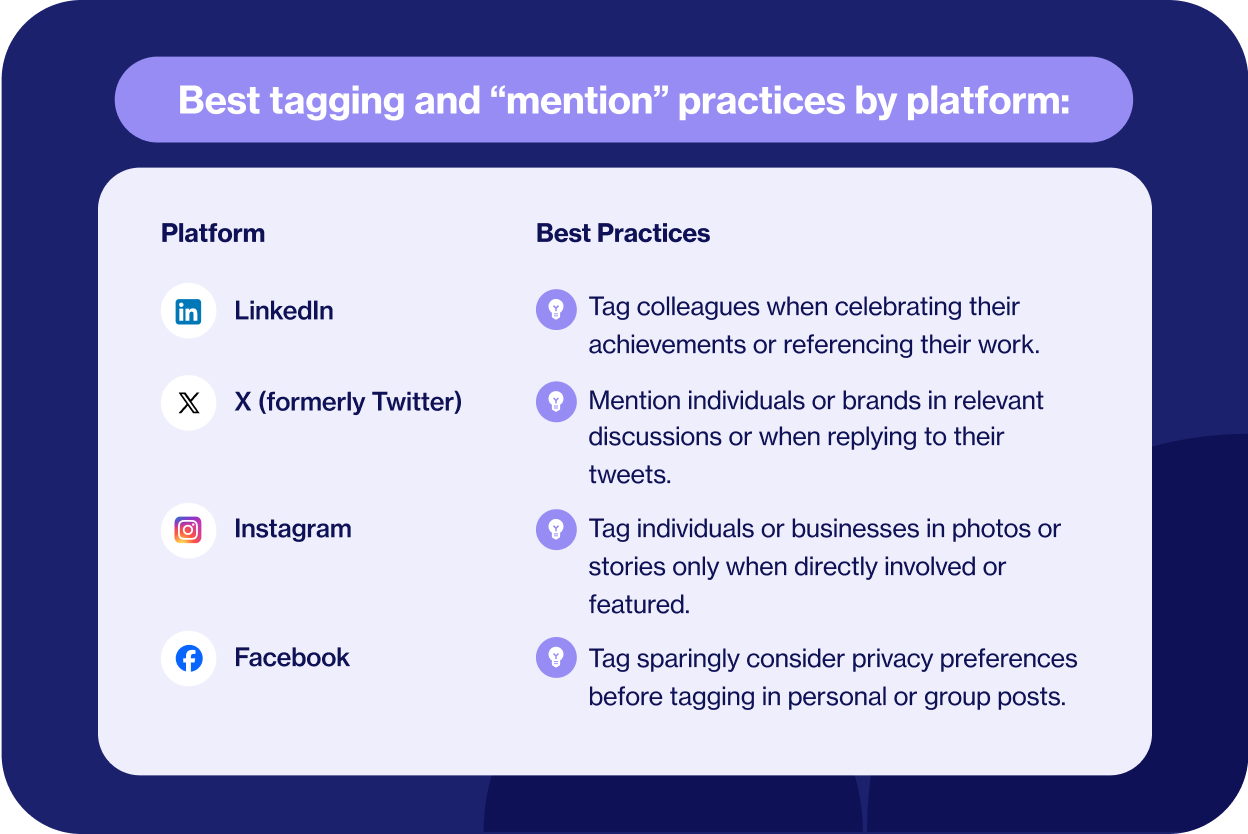
Content strategy
To succeed on social media, employees should aim for a balance of value-driven, authentic, and platform-specific content.
Key components:
- Value-driven content: Share insights, actionable tips, or industry trends that can resonate with your network.
- Personal elements: Your opinion and your experiences matter. Use personal anecdotes or reflections to humanize your content.
- Platform-specific approach: Tailor your content and tone to fit your network.
- Content balance: Mix professional, personal, and curated content to keep your profile interesting to follow.
- Authenticity: Be honest and transparent but aligned with company values.
- Sensitive topics: Avoid posting about controversial issues unless the topic is directly connected to your expertise.
Engagement strategy
Engagement is the cornerstone of effective social media activity. Consider the following strategies:
- Foster meaningful dialogue: Reply to comments and ask follow-up questions to deepen conversations.
- Ask open-ended questions: This encourages others to share their perspectives.
- Support arguments with data: Enhance credibility by citing reputable sources or evidence.
- Focus on solutions: Avoid contributing to negativity; emphasize constructive outcomes.
- Grow your network: Accept connection requests and follow others posting engaging and valuable content.
Content planning
Consistent planning is essential for staying active on social media:
- Strategic content ratios: Use the 4-1-1 rule: 4 value-driven posts, 1 personal post, and 1 company-related post.
- Follow company tone guidelines: Ensure your tone aligns with your organization’s social media voice.
- Maintain visual consistency: Use branded templates or consistent aesthetics for visual posts.
Take into consideration engagement and authenticity
Active participation:
Actively engage with your network by liking content they post, commenting and answering their questions, and sharing relevant content by you.
Building genuine connections:
Build professional relationships worldwide by showing genuine interest in others’ content. When you respond to a post and add your opinion, people will understand you care about what they are posting about.
Balancing professionalism and authenticity:
- Stay true to your personality while maintaining respect and professionalism.
- Avoid controversial humor or overly casual language.
- Never disrespect
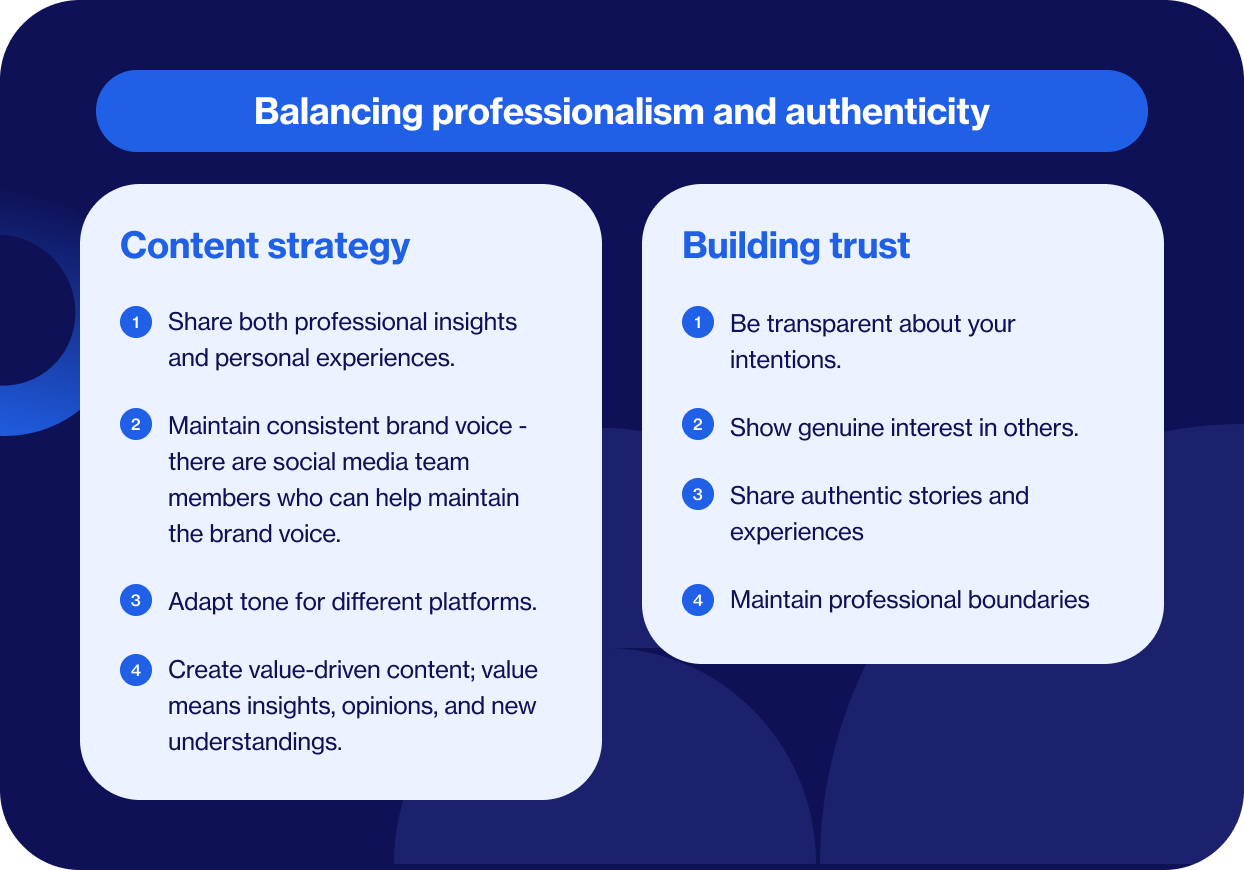
AI can help you write and summarize, but use it wisely
Key considerations:
- Accuracy issues: Always verify AI-generated content for factual correctness.
- Authenticity: When creating content with AI tools, review and edit to avoid writing that lacks your voice or perspective.
- Legal and ethical concerns: Be cautious of intellectual property or privacy issues when using AI tools.
By following these guidelines, employees can confidently and effectively represent themselves and their company on social media, achieving a balance between authenticity and professionalism.
Download and share with your team
Social media employee handbook: Balancing authenticity and professionalism


